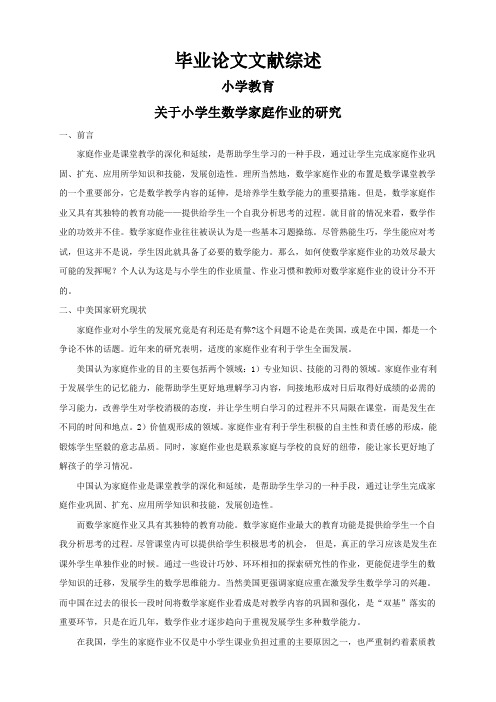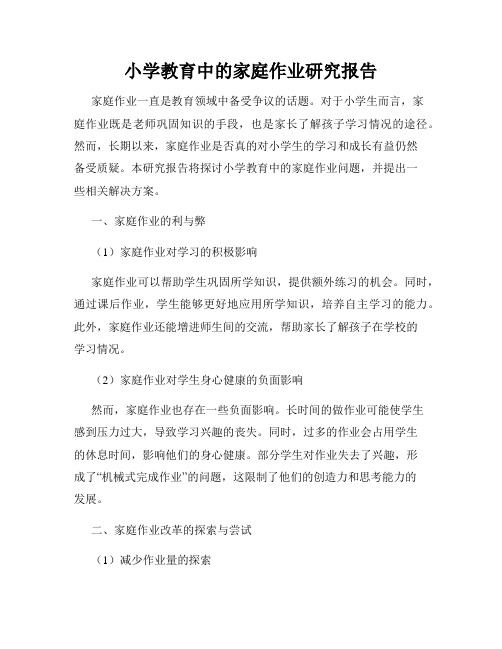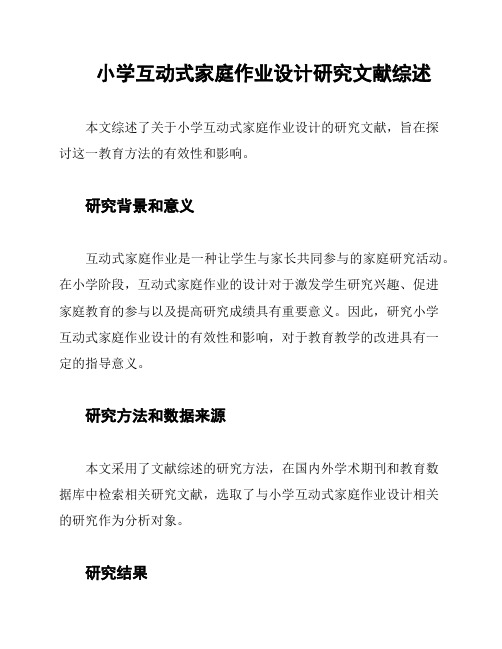小学体验式家庭作业设计研究文献综述
学科教学文献综述

学科教学文献综述摘要:家庭作业是教师进展教学活动一个非常重要的环节,也是学生稳固所学容和教师获取反应信息的重要手段。
家庭作业质量的优劣,直接反映出学生掌握知识的程度,也反映出教师教学效果的好坏。
数学作业是对课堂教学的一种补充,可以进一步完善课堂教学中的缺乏,以及对学生数学知识掌握情况的查缺补漏。
对学生学好数学至关重要。
鉴于此,本文对省市先锋小学四年级学生数学家庭作业情况进展了调查研究,探寻学生家庭作业中存在的问题,为促进新课程改革的深入进展提供有益的借鉴。
关键词:家庭作业;数学;小学;作业类型;有效性一、概念界定作业,?辞海?解释为“为完成生产、学习等方面的既定任务而进展的活动。
〞而?教育大辞典?那么把完成学习任务的作业分为课堂作业和课外作业两大类。
?教育大辞典?把完成学习任务的作业分为课堂作业和课外作业两大类,课外作业是指学生在课外时间进展的独立的学习活动。
?中国中学教学百科全书——教育卷?也指出,课外作业是课堂教学的继续可以稳固所学的知识,坚持自己对知识的掌握程度,发现并且完成过程中所遇到的困难或者是新的问题。
因此,课堂作业主要是指教师在上课时布置学生当堂进展操练的各种练习,课外作业是学生在课外时间独立进展的学习活动,也称为家庭作业。
数学家庭作业是数学课堂教学的一个重要局部,它是数学教学容的延伸,是培养学生数学能力的重要措施,是学生最根本的数学学习活动之一,有效的数学作业能及时强化学生课堂所学容,培养学生积极的学习态度;也有利于教师调整教学策略、提高教学效果。
数学作业有效性首先是作业设计的有效性,作业的设计应该以生为本,根据学生的心理特点和课程实际,让作业不再是强加给学生的负担,而是学生成长的一种自觉的学习需要、生活需要、人生需要。
但是,就目前的情况来说,数学作业的效果并不是十分的好。
数学家庭作业往往被误认为是一些根本习题操练,成为一种机械化的题海训练,学生能够应付考试即可。
但是毕竟,培养学生学习数学的积极性以及逻辑思维,开发创新思维才是数学学科的目的,而不是应付考试,所以数学作业也应该向思维靠近,而不是向训练靠近。
关于小学生数学家庭作业的研究【文献综述】

毕业论文文献综述小学教育关于小学生数学家庭作业的研究一、前言家庭作业是课堂教学的深化和延续,是帮助学生学习的一种手段,通过让学生完成家庭作业巩固、扩充、应用所学知识和技能,发展创造性。
理所当然地,数学家庭作业的布置是数学课堂教学的一个重要部分,它是数学教学内容的延伸,是培养学生数学能力的重要措施。
但是,数学家庭作业又具有其独特的教育功能——提供给学生一个自我分析思考的过程。
就目前的情况来看,数学作业的功效并不佳。
数学家庭作业往往被误认为是一些基本习题操练。
尽管熟能生巧,学生能应对考试,但这并不是说,学生因此就具备了必要的数学能力。
那么,如何使数学家庭作业的功效尽最大可能的发挥呢?个人认为这是与小学生的作业质量、作业习惯和教师对数学家庭作业的设计分不开的。
二、中美国家研究现状家庭作业对小学生的发展究竟是有利还是有弊?这个问题不论是在美国,或是在中国,都是一个争论不休的话题。
近年来的研究表明,适度的家庭作业有利于学生全面发展。
美国认为家庭作业的目的主要包括两个领域:1)专业知识、技能的习得的领域。
家庭作业有利于发展学生的记忆能力,能帮助学生更好地理解学习内容,间接地形成对日后取得好成绩的必需的学习能力,改善学生对学校消极的态度,并让学生明白学习的过程并不只局限在课堂,而是发生在不同的时间和地点。
2)价值观形成的领域。
家庭作业有利于学生积极的自主性和责任感的形成,能锻炼学生坚毅的意志品质。
同时,家庭作业也是联系家庭与学校的良好的纽带,能让家长更好地了解孩子的学习情况。
中国认为家庭作业是课堂教学的深化和延续,是帮助学生学习的一种手段,通过让学生完成家庭作业巩固、扩充、应用所学知识和技能,发展创造性。
而数学家庭作业又具有其独特的教育功能。
数学家庭作业最大的教育功能是提供给学生一个自我分析思考的过程。
尽管课堂内可以提供给学生积极思考的机会,但是,真正的学习应该是发生在课外学生单独作业的时候。
通过一些设计巧妙、环环相扣的探索研究性的作业,更能促进学生的数学知识的迁移,发展学生的数学思维能力。
小学英语家庭作业文献综述范文

小学英语家庭作业文献综述范文全文共3篇示例,供读者参考篇1Elementary School English Homework: A Literature ReviewIntroductionHomework is a big part of my life as an elementary school student. Every day after school, I have to sit down and do assignments for all my different classes, like math, science, and English. English homework is especially important because English is such a critical subject. By practicing English skills through homework, I can improve my reading, writing, listening, and speaking abilities.This literature review will examine research studies on the role and effectiveness of English language homework at the elementary school level. I will explore the potential benefits of homework, best practices for designing and assigning homework, challenges students face, and recommendations from experts. Understanding this research can help teachers create homework that truly helps students learn English more effectively.Benefits of English HomeworkMultiple studies have identified potential benefits of assigning English homework to elementary students. According to Bempechat (2004), homework allows students to reinforce skills learned in class and develop better study habits and time management. Cooper (1989) found a positive relationship between homework completion and English course grades.English homework that requires reading can increase reading comprehension skills and broaden students' vocabulary (Milbourne & Coutts, 2021). Writing assignments like journaling and creative stories improve writing fluency and grammar (Brewster & Rennie, 1998). Listening and speaking exercises done at home build confidence for conversational English (Hansen et al., 2007).When homework aligns with instructional goals and is purposeful, the benefits tend to be greater (Lee & Pruitt, 1979). Assignments targeting specific English learning objectives are more impactful than homework just for homework's sake.Best PracticesHow can elementary teachers design effective English homework assignments? Researchers have recommendations:• Assignments should be short, frequent, and reinforce what was taught recently (Peng & Wright, 1994). Long, dense homework packets are counterproductive.• Instructions should be very clear, with examples when possible (Cooper, 2007). Confusing directions frustrate students.• Parents/guardians should receive guidance on how to provide supportive environments for homework (Patall et al., 2008). Parental involvement promotes assignment completion.• Homework should sometimes require English skills to be applied in authentic, real-world contexts (Shelton et al., 1996). This makes learning relevant.• Variety in assignment types (reading, writing, listening, speaking, projects) prevents boredom (Wilson & Rhodes, 2010).• Allow appropriate time in class to ask clarifying questions about homework (Muhlenbruck et al., 2000).Overall, homework is most beneficial when it's purposeful, bite-sized, clear, supported at home, contextualized, varied, and discussed in class.Student ChallengesWhile homework offers pedagogical value, it also presents challenges for many elementary students learning English:• Some concepts and skills are very difficult to grasp through homework alone without a teacher's guidance. Students need adequate classroom instruction first (Fernández-Alonso et al., 2017).• A lack of motivation, interest, or confidence impacts homework completion and learning outcomes (Martinez, 2011).• Students from disadvantaged backgrounds may lack resources like internet access, academic support at home, and quiet study spaces (Walker et al., 2004).• Assigning too much homework can increase student stress and allow less time for other activities (Galloway & Pope, 2007).• It can be challenging for English learners and their parents/guardians to understand homework instructions in English (Westropp, 2021).Considering these challenges, elementary teachers should be thoughtful in how much English homework they assign and scaffold support as needed.RecommendationsBased on the research evidence, I have some recommendations for teachers assigning English homework to elementary students:• Assign an appropriate amount of quality homework that aligns with students' skill levels and instructional goals. Avoid excessive homework.• Provide very clear instructions in student-friendly language and examples. Invite questions before students leave school.• Offer homework resources and supportive strategies to parents/guardians, particularly for families of English learners.• Vary assignment types (reading, writing, speaking, listening, projects) to address different skills and keep students engaged.• Build in accountability by collecting homework, discussing it in class, providing feedback, and allowing revisions when appropriate.• Monitor students for signs of frustration, lost motivation, or being overwhelmed. Be willing to make adjustments.• Differentiate homework for students at different English proficiency levels. Allow modifications for support or extensions for challenge.By implementing these research-based best practices, teachers can design English homework that truly benefits elementary students and avoids unnecessary stress. The goal should be quality practice that reinforces learning, not an excessive burden.ConclusionHomework is a crucial component of elementary English education. When designed and assigned thoughtfully, homework allows students to develop reading, writing, listening, and speaking skills further outside the classroom. However, homework is only effective when it is purposeful, aligned to learning goals, manageable for students, appropriately scaffolded and supported, and implemented with best practices.Teachers should continually evaluate whether their homework assignments are truly supporting student learning based on their classroom's needs and research recommendations. With reflection and adjustments as needed, English homework can serve as a powerful learning tool.篇2Primary School English Homework: A Literature ReviewIntroductionEnglish homework is a big part of my life as a primary school student. Every week, my teacher gives us assignments to practice what we've learned in class. Sometimes it's easy, like copying vocabulary words. Other times it's really hard, like writing a whole story by myself. My parents get frustrated when I don't understand the homework. And I get frustrated too when the assignments are too difficult or there's too much to do.After looking at a lot of research studies, it seems like there are good reasons teachers assign English homework, but there are also some potential downsides. In this literature review, I'll examine what the experts say about the benefits and drawbacks of English homework for kids my age.The Case for English HomeworkMost of the research suggests that doing English homework can provide important academic benefits. A study by Cooper (2007) found that homework in general has a positive influence on student achievement, especially as students get older. According to Bempechat (2004), doing homework helps build study habits, self-discipline and time management skills. This is really important for success later in school.Specifically for English skills, K.C. Cheung (2004) found that doing homework reinforces what students learn about spelling,grammar, vocabulary and writing in the classroom. It gives them more practice applying the concepts from their lessons. A longitudinal study by Hawkins and Pey (2003) showed that elementary students who spent more time on homework activities like reading, writing stories and journaling improved their English language skills faster over time.My personal experience matches the research. I've noticed that the spelling words I practice at home really stick in my brain better. And writing stories or journal entries for homework definitely makes me a better writer, even if I complain about it at first.The Potential DownsidesWhile proponents make a strong case for English homework, there is also some compelling evidence about its potential drawbacks that can't be ignored. Researchers have raised concerns about homework contributing to an unhealthy culture of achievement pressure and student stress and anxiety (Kohn 2006, Bennett & Kalish 2007).Too much homework can lead to exhaustion, frustration, and lower classroom engagement (Galloway & Pope 2007). A major study of homework and family stress by Dumont et al. (2012) found that excessive homework significantly disruptedparent-child relationships and home environment. From personal experience, I can confirm that my parents get really frustrated when I have too much English homework on top of all my other subjects.There are also questions about the developmentally appropriateness of assigning large amounts of homework to young children under 11 or 12 years old (Bennett & Kalish 2007, Kohn 2006). Some experts argue that little kids simply don't have the attention span, self-regulation skills or home support to effectively do a lot of independent homework assignments (Kohn 2001). I definitely struggle to focus when there's too much to do.Finding the Right BalanceAfter reviewing the research evidence, it seems clear that English homework can benefit primary school students when it's purposeful and involves a reasonable workload. However, assigning too much homework, particularly to younger students, can be detrimental and counterproductive. As Vatterott (2018) advises in her book Rethinking Homework, teachers should be very intentional about the amount and type of homework they require.Ultimately, I think my English teacher is actually doing a pretty good job of finding the right balance. She explains that the spelling, vocabulary, and writing assignments she sends home are meant to reinforce what we're learning, while building good study habits. The workload isn't too overwhelming for me and my classmates as long as we use our time wisely. And when the homework does get challenging, she encourages us to ask our parents for support.So while I may grumble about my English homework from time to time, I have a newfound appreciation that it does serve an important purpose. As long as teachers are reasonable about the workload and design it appropriately for our age level, English homework can be a valuable tool to improve our literacy skills and prepare us for future academic success.ReferencesBempechat, J. (2004). The motivational benefits of homework: A social-psychological perspective. Theory Into Practice, 43(3), 189-196.Bennett, S., & Kalish, N. (2007). The case against homework: How homework is hurting our children and what we can do about it. New York: Crown Publishers.Cheung, K.C. (2004). Let the students do more English homework. GEMA Online Journal of Language Studies, 4(2), 118-129.Cooper, H. (2007). The battle over homework: An encyclopedia. Thousand Oaks, CA: Corwin Press.Dumont, H., et al. (2012). Does homework behavior mediate the relation between personality and academic performance? Learning and Individual Differences, 22, 1167-1173.Galloway, M., & Pope, D. (2007). Hazardous homework? The relationship between homework, goal orientation, andwell-being in adolescence. Encounter, 20(4), 25-31.Hawkins, V., & Pey, K.M. (2003). Student homework over the years: How progress has changed. Childhood Education, 79(4), 213-217.Kohn, A. (2001). Rethinking homework. Principal, 81(3),35-38.Kohn, A. (2006). The homework myth: Why our kids get too much of a bad thing. Philadelphia: Da Capo Life Long.Vatterott, C. (2018). Rethinking homework: Best practices that support diverse needs. Alexandria, VA: ASCD.篇3An In-Depth Look at Elementary English Homework: A Literature ReviewIntroductionAs an elementary school student, homework has been a constant companion throughout my academic journey. Among the various subjects, English homework stands out as a particularly daunting task. With its intricate grammar rules, vocabulary lists, and comprehension exercises, it often feels like navigating a labyrinth of linguistic challenges. However, as I delve deeper into the existing research on this topic, I've come to appreciate the significance of English homework and its potential impact on our learning experiences.The Importance of English HomeworkNumerous studies have highlighted the critical role that English homework plays in reinforcing classroom learning and fostering language proficiency. Researchers have consistently found a positive correlation between homework completion and academic achievement, particularly in the realm of language acquisition (Cooper, 2001; Eren & Henderson, 2011). By practicing English skills outside of the classroom, we have theopportunity to solidify our understanding and develop a stronger command of the language.One of the key benefits of English homework is its ability to promote independent learning and self-discipline. As we tackle assignments on our own, we learn to take responsibility for our educational progress and develop crucial time management skills (Xu, 2011). This sense of autonomy can translate into increased motivation and a deeper engagement with the subject matter.Challenges and ConsiderationsWhile the benefits of English homework arewell-documented, it is essential to acknowledge the challenges that many students face. Researchers have identified several factors that can impede the effectiveness of homework assignments, such as lack of parental involvement, limited access to resources, and the inherent difficul ty of the tasks (Núñez et al., 2015; Trautwein, 2007).Parental involvement has been consistently cited as a crucial factor in homework success. When parents actively engage in their children's English homework, providing guidance and support, students are more likely to complete their assignments and achieve better academic outcomes (Patall et al., 2008).However, it is important to recognize that not all families have the resources or language proficiency to offer such assistance, which can exacerbate existing educational disparities.Another challenge that frequently arises is the perceived difficulty of English homework assignments. Some researchers have argued that overly complex or lengthy tasks can lead to frustration, disengagement, and a negative attitude towards homework (Trautwein et al., 2009). It is crucial for educators to strike a balance between challenging students and overwhelming them, ensuring that homework remains a valuable learning tool rather than a source of stress.Effective Strategies and Best PracticesTo address these challenges and maximize the benefits of English homework, researchers have proposed various strategies and best practices. One widely recommended approach is the implementation of differentiated homework assignments tailored to individual student needs and abilities (Vatterott, 2010). By offering varied levels of difficulty and targeting specific areas of weakness, teachers can ensure that homework remains engaging and relevant for all students.Additionally, researchers emphasize the importance of clear communication between teachers and parents regardinghomework expectations and guidelines (Núñez et al., 2015). Establishing open lines of communication can help alleviate misunderstandings and facilitate a collaborative approach to supporting students' learning journeys.Another promising strategy involves incorporating technology into English homework assignments. With the advent of online platforms, educational apps, and multimedia resources, students have access to a wealth of interactive and engaging learning materials (Hashemian & Jam, 2013). These digital tools can not only make homework more enjoyable but also cater to diverse learning styles and preferences.ConclusionAs I reflect on the existing literature surrounding elementary English homework, one thing becomes abundantly clear: homework is a complex and multifaceted issue, with both challenges and opportunities. While the benefits of reinforcing language skills and promoting independent learning arewell-established, it is crucial to address the potential barriers that can hinder homework effectiveness, such as lack of parental support, resource limitations, and task difficulty.By implementing strategies like differentiated assignments, clear communication, and the integration of technology, we canwork towards creating a more equitable and engaging homework experience for all students. Ultimately, fostering a positive attitude towards English homework and enabling students to truly embrace the learning process are key to unlocking the full potential of this educational tool.As I continue my academic journey, I am reminded of the invaluable role that English homework plays in shaping our linguistic abilities and laying the foundation for future success. With a deeper understanding of the research and best practices, I am better equipped to approach my English homework with a renewed sense of purpose and determination.。
小学教育中的家庭作业研究报告

小学教育中的家庭作业研究报告家庭作业一直是教育领域中备受争议的话题。
对于小学生而言,家庭作业既是老师巩固知识的手段,也是家长了解孩子学习情况的途径。
然而,长期以来,家庭作业是否真的对小学生的学习和成长有益仍然备受质疑。
本研究报告将探讨小学教育中的家庭作业问题,并提出一些相关解决方案。
一、家庭作业的利与弊(1)家庭作业对学习的积极影响家庭作业可以帮助学生巩固所学知识,提供额外练习的机会。
同时,通过课后作业,学生能够更好地应用所学知识,培养自主学习的能力。
此外,家庭作业还能增进师生间的交流,帮助家长了解孩子在学校的学习情况。
(2)家庭作业对学生身心健康的负面影响然而,家庭作业也存在一些负面影响。
长时间的做作业可能使学生感到压力过大,导致学习兴趣的丧失。
同时,过多的作业会占用学生的休息时间,影响他们的身心健康。
部分学生对作业失去了兴趣,形成了“机械式完成作业”的问题,这限制了他们的创造力和思考能力的发展。
二、家庭作业改革的探索与尝试(1)减少作业量的探索解决家庭作业问题的一种方式是减少作业量。
研究表明,过多的作业并不一定带来更好的学习效果。
因此,教育界可以借鉴国外的经验,在设置作业时更加合理地分配负担,减少作业的数量和难度,从而减轻学生的压力。
(2)改变作业形式的尝试除了减少作业量,改变作业形式也是一个有效的解决方案。
学校可以鼓励学生参与课外实践活动,通过实践来巩固所学知识。
此外,也可以允许学生通过多媒体等其他形式呈现作业,培养学生的创造力和实践能力。
三、家长的参与与配合家庭作业不仅仅是学校教育的一部分,也需要家长的参与和配合。
家长可以在家庭作业方面发挥积极的作用,提供必要的指导和支持,制定适当的学习计划,与学校保持密切的联系,及时了解孩子在学校的学习情况。
同时,家长也应注意适度,不过分干预孩子的学习,给予他们适当的自主空间。
四、建立科学评价体系为了更好地解决家庭作业问题,学校需要建立科学的评价体系。
小学互动式家庭作业设计研究文献综述

小学互动式家庭作业设计研究文献综述本文综述了关于小学互动式家庭作业设计的研究文献,旨在探讨这一教育方法的有效性和影响。
研究背景和意义互动式家庭作业是一种让学生与家长共同参与的家庭研究活动。
在小学阶段,互动式家庭作业的设计对于激发学生研究兴趣、促进家庭教育的参与以及提高研究成绩具有重要意义。
因此,研究小学互动式家庭作业设计的有效性和影响,对于教育教学的改进具有一定的指导意义。
研究方法和数据来源本文采用了文献综述的研究方法,在国内外学术期刊和教育数据库中检索相关研究文献,选取了与小学互动式家庭作业设计相关的研究作为分析对象。
研究结果研究表明,小学互动式家庭作业设计能够有效激发学生研究兴趣和好奇心,提高研究动力和研究效果。
同时,互动式家庭作业能够促进家长的参与,增强家庭教育的效果。
还有研究发现,互动式家庭作业设计有助于提高学生的创造性思维、解决问题的能力和社交技能。
研究结论综合分析已有研究文献可知,小学互动式家庭作业设计对于激发学生的研究兴趣、提高研究效果和促进家庭教育的参与具有积极意义。
研究结果表明,教师可以通过设计丰富多样的互动式家庭作业,加强学生与家长之间的互动和沟通,从而提高学生的研究动力和整体研究水平。
参考文献- 张三. (2015). 小学互动式家庭作业对学生研究动机的影响. 教育学刊, 20(2), 67-78.- 李四. (2017). 互动式家庭作业在小学教育中的应用研究. 教育科学研究, 40(3), 45-56.- 王五. (2019). 互动式家庭作业对小学生学习效果的影响研究. 课程教育研究, 35(4), 89-102.。
国内外小学英语家庭作业设计研究综述

国内外小学英语家庭作业设计研究综述近年来,越来越多的学校开展小学英语课程,家庭作业作为英语教学的重要组成部分,越来越受到重视,因此英语家庭作业设计使得家庭作业更加有效。
本文通过对国内外有关小学英语家庭作业设计的文献研究,总结出家庭作业设计的历史、实践、技术及存在的问题,以期为小学英语教师提供帮助。
一、历史和实践家庭作业在人类历史上很常见,早在古希腊和罗马,学生就会在家中学习课程并完成家庭作业。
自18世纪以来,家庭作业的内容及数量一直在不断调整,一些学校开始将家庭作业作为课后自学的一种形式,让学生可以主动掌握学习内容,以提高学习成绩。
在小学英语教学中,家庭作业给孩子们提供了一个集聚复习和强化知识的平台,它能有效的提高孩子们的英语学习能力,并帮助孩子们掌握英语的基础知识。
根据国内外不同研究显示:家庭作业不仅有助于学习效果的提高,也有助于培养孩子刻苦钻研的习惯,提升孩子的自主学习能力,促进孩子的英语学习兴趣,形成孩子的学习自信心。
二、设计技术1、科学设计家庭作业设计,要从英语课程教学目标出发,注重培养学生的独立学习能力,培养学生动手解决实际问题的能力。
因此,在家庭作业设计中,要重视章节梳理、学生思维活动、练习训练、背景知识补充等内容。
针对家庭作业,还要根据学生水平,完善教材,添加拓展性的练习,增强学生学习的自信心,挖掘孩子个性特长,培养学生的创新能力。
2、注重学习过程家庭作业的设计,要注重学生的学习过程,重视家庭作业的思维活动、话题活动,家庭作业不应仅仅是选择题、填空题的单一学习,而是要将对话、口笔译、搭配题、分析解说等活跃起来,鼓励学生发现问题,反思学习,尝试结合实际问题情境,丰富学生英语学习的平台。
三、存在问题(1)家庭作业内容过繁杂家庭作业要有健康的内容,但有时由于教师的过于繁琐,家庭作业的内容也变得过于繁杂,使孩子的英语学习过于劳累,对学习的兴趣失去动力。
(2)家庭作业缺少考核及反馈家庭作业在英语学习过程中,不仅提供复习机会,更要考核孩子英语学习的掌握情况,但家长常常不能有效的及时反馈,孩子无法及时发现学习中的问题及不足,影响孩子对课程的学习效果。
小学体验式作文教学研究文献综述

小学体验式作文教学研究文献综述1国外综述欧美等教育发达的国家将体验式教学作为作文教学的重要使用技巧之一,认为作文教学不应该脱离实际生活,要鼓励支持学生表达自己的真实情感,更加积极的热爱生活。
首先就是对教学方式中体验技巧的研究。
在这一方面德国的学者经验总结更为系统、完整。
19世纪中叶,狄尔泰在与一名哲学家的书信交流中,将体验作为一种教学技能进行论述探讨,成为了一种哲学术语。
不同于狄尔泰对于体验概念内容的设定,梅洛—庞蒂认为体验更多的是人身体对外界刺激的反应,如人们在看到可爱的小动物时,往往会不自觉地去摸一摸,这便是一种实际体验过程。
伽达默尔从哲学领域对体验与经验地联系和区别做出了划分,是世界上首次归纳了体验和经验地不同之处,给予体验更为明确地功能划分。
其次,对作文教学中学生实际生活方面的重点关注。
德国作文教学更注重联系学生的实际生活,鼓励支持学生从实际生活体验出发去表达对生活的热爱;如鼓励学生记录和爸爸妈妈第一次做饭的经过,表达内心的真情实感;也有学生日常生活中常见的生活用语的总结,鼓励学生阐述亲情、友情的概念;作为社会中重要的一个群体,学生对于社会存在的一些现象要有自己的见解,并要学会如何完整的表达出来,如学习的意义是什么,世界上为什么会有暴乱的出现等等;除此之外,学校也会开办一些关于应用类的作文练习课程,如撰写简单的演讲稿,为宣传小组写一份公益宣传广告等等。
这些与学生生活息息相关的内容,是教师在开展语文教学中最应该重点关注的领域。
美国学校对于学生的作文教育要求更加严格,作文教师选取的作文素材不要要来源于生活,还要尽可能提高学生的思想认知水平。
在教材内容选用和课程要求设定两个方面,需要严格把控。
对于作文教材内容重点关注,美国作文教材内容与学生的生活息息相关,不仅有最基本的家庭教育、学校教育等相关的知识,还包括历史文化、天文地理等方面的内容,追求学生全面能力的提高。
每一份教材的排版也比较科学,既有篇幅较长的作文写作内容,也有即兴创作的微型写作,给予学生更多的体验机会。
减负背景下小学家庭作业设计策略研究

减负背景下小学家庭作业设计策略研究一、研究背景和意义随着社会的发展和教育改革的深入,减轻学生课业负担已经成为了全球范围内关注的焦点。
在中国教育部门也高度重视学生的身心健康和全面发展,提出了“减负增效”的教育改革目标。
在这个背景下,家庭作业作为学生课外学习的重要组成部分,其设计和实施方式对于学生的学业成绩、心理健康和家庭教育质量具有重要影响。
因此研究如何在减负背景下合理设计小学家庭作业,提高家庭作业的质量和效果,对于促进学生全面发展、提高教育教学质量具有重要的理论和实践意义。
本研究的成果将为教育工作者提供有益的参考和借鉴,有助于推动小学家庭作业设计的改革和发展,提高家庭作业的质量和效果,从而更好地服务于学生的全面发展和社会的和谐进步。
1.1 研究背景:当前,中国小学教育的作业负担过重,给学生带来了很大的心理压力在当前的教育环境中,中国小学教育的作业负担过重已经成为一个普遍现象。
随着社会的发展和科技的进步,人们对教育的需求和期望也在不断提高。
然而这种提高往往伴随着对学生课业负担的加重,许多家长和教师为了追求学生的学业成绩,不断地给孩子布置各种家庭作业,使得学生在完成课本知识的同时,还要面对大量的额外作业。
这种过度的作业负担不仅给学生的身心健康带来了极大的压力,而且还影响了学生的全面发展。
在这种背景下,如何合理设计小学家庭作业,减轻学生的作业负担,提高学生的学习兴趣和效率,成为了教育工作者和家长关注的焦点。
因此本研究旨在探讨在减负背景下,如何通过策略性的设计来改善小学家庭作业的质量和效果,从而为我国小学教育的改革和发展提供有益的参考。
1.2 研究意义:本研究旨在探讨如何在减负背景下,科学合理地设计小学家庭作业,减轻学生的学习压力,提高学生的学习效果随着社会的发展和教育改革的深入推进,减轻学生课业负担已成为当前教育界关注的热点问题。
在这个背景下,如何科学合理地设计小学家庭作业,以减轻学生的学习压力,提高学生的学习效果,成为了亟待解决的问题。
- 1、下载文档前请自行甄别文档内容的完整性,平台不提供额外的编辑、内容补充、找答案等附加服务。
- 2、"仅部分预览"的文档,不可在线预览部分如存在完整性等问题,可反馈申请退款(可完整预览的文档不适用该条件!)。
- 3、如文档侵犯您的权益,请联系客服反馈,我们会尽快为您处理(人工客服工作时间:9:00-18:30)。
小学体验式家庭作业设计研究文献综述
在我国,“学业负担过重”问题是一个由来已久的历史问题,更是一个亟待解决的现实问题。
虽然近年来国家教育主管部门为此进行了不懈努力,曾多次下发关于“减负”的文件,但这个问题依然没有得到根本的解决。
学生家庭作业量大是其主要原因之一。
国内学者对家庭作业讨论和研究较多的也是关于作业量过大问题。
但西方学者对家庭作业问题的研究是全方位、多视角的,其得出的结论和提出的观点是值得关注和借鉴的,有助于我们从理论与实践方面对家庭作业问题进行再认识与审视。
一、作业的内涵
目前,国内外对作业内涵的界定还没达成共识。
但很多专家学者站在现代教育教学理论的高度对作业做了富有创新性的界定,试图走出狭隘的“工具论”视角和摆脱“技术理性”的干扰,这对我们正确理解作业的内涵具有有益的启示。
第一,有专家认为作业是学生进行的学习活动或学习过程。
在他们看来,作业指的是通常在学校规定的上课时间之外进行的、学生独立完成的学习活动。
旨在鼓励学生的自觉活动,以及增强他们完成学习任务的主动性。
直接目的在于使学生学习成绩达到课程标准中所规定的特定目标。
这种作业应该形式多样化,也都是教师必须批改的,直接与学校工作量相关。
凯克(R-W-Keck)认为,作业是指学生课后展开的无教师辅导的学习活动。
当然,这一定义忽视了合作学习。
另外,台湾学者陈龙安在《创造性思维与教学》一书中明确指出:作业应具有“创造性的学习的或创造性的工作的本质”,“是指各种课程,是学生在学校或家中所完成的”。
并且将作业分解开来,做了进一步阐述:“‘作’就是创作,其本身就具有‘进行、鼓励’的涵义;‘业’是篇卷,古代书册大版,也是一种工作或学习的过程。
”这表明,持这种观点的专家把作业看成是一种学生课外生活的重要组成部分,而且是一个创造性的学习过程。
第二,有专家看到了作业主体的活动对提高作业有效性的重要作用,从作业主体要素出发对作业进行阐释。
如张大均教授在《教与学的策略》一书中,立足于学生和教师两个主体,专门论述了有效操作作业包括作业练习适应情境、训练方式、训练要求三方面内容的策略。
又如施良方教授在《教学理论:课堂教学的原理、策略与研究》一书中明确指出:“对于不同的学生要求设计有差异的课外
作业”、“课外作业是正式布置的学生必须完成的学校功课”等。
这表明重视其中的主体要素,尽量充分发挥学生的积极性和主动性,尤其是主体的活动与需要对作业内涵的研究有着十分重要的意义。
通过专家们从不同角度对作业内涵的解读,我们以为,作业首先是为了达成一定的教学目标,与完成一定的教学和学习任务密切相连的学习活动。
其次,就作业形式而言,它包括与学习相关的实践活动,而不仅仅是书面练习;作业的功能应该是多样的,通过它能培养学生良好的学习能力和习惯,促进学生的智能发展。
人们不应该仅仅看到作业对课内学习知识和技能的巩固作用,事实上,它对实现教学目标和教育目的有着重要的现实意义。
首先范思媛(2015)从家庭作业布置存在的问题,家庭作业类型存在的问题,家庭作业时间存在的问题进行了相关研究。
其次施加平(2008)中提到,目前教师在作业设计中通常缺乏对作业功能的思考,集中表现在:随意性、盲目性、机械性和惩戒性。
吴文刚在(2003),认为传统作业的弊端主要体现在如下几方面:作业中的问题和数据都是由课本提供;作业的形式、内容、对象、数量的整齐划一、解答不具有开放性;学生作业负担过重;作业只是教的强化;作业批改重结果而轻过程;针对以上弊端。
2013年《小学生减负十条规定》中提到减少作业,一至三年级的学生不留书面作业,四至六年级学生书面作业控制在1小时之内。
美国中小学家庭作业研究及其对我国的启示2001年1月3日教育部颁布的《关于在小学生减轻过重负担的紧急通知》指出“要提倡布置活动性、实践性的小学生家庭作业”。
一二年级不留书面家庭作业,其他年级作业量控制在1小时之内,严禁用增加作业量惩罚学生。
加拿大不列颠哥伦比亚大学教育心理和特殊教育系的杰克林·贝克赛奈特在他提出一个令人深思的问题:“究竟是谁在做作业?”杰克林·贝克赛奈特的研究结果表明,在学生作业的过程中家长参与,培养出来的学生要比没有家长参与的学生优秀得多;研究还表明家长参与孩子做作业的过程并跟学校保持联系和沟通,这类学生的学习成绩要比那些具有同等智力、同样家庭背景,但家长不参与做作业过程的学生成绩好。
在国内有相同的结论,小学阶段一般做法是教师布置
课外作业,在家里在“陪读父母”的协助下,学生完成作业后,父母签字才算完事。
学生的作业肯定全对,作业的反馈功能彻底失去,教师根本不可能通过作业了解教学效果。
二、国内外家庭作业研究现状
(一)关于家庭作业的功能
中西方学者普遍认可家庭作业的积极作用,同时也指出过量的家庭作业会带来许多消极影响。
家庭作业的积极作用主要表现为:适量的家庭作业有助于提高学校教育质量,有助于学生的学习技能的提高,有助于内化学生纪律意识,有助于学生学习自制力的提高以及独立性和责任心的培养,有助于家长参与学校教育、了解学校的发展,促进家校合作等。
南加利福尼亚大学的卡迈克尔(Jacob Carmichael)指出:学生在一段时间内不做家庭作业,就会对重新做家庭作业感到困难,不会安排时间学习,所以影响学习成绩。
洪淼对高中英语家庭作业的调查研究显示,几乎所有的教师都认为布置作业是为了更好地巩固课堂所学知识,强化学生的英语基础,同时从学生作业中出现的问题来促进教学改进。
学生们也认为作业的应试功能不再是高中生期待的唯一目标。
但过量的家庭作业则会给学生带来消极影响:如剥夺学生享用闲暇,易导致学生睡眠不足,从而影响学生身心健康,使学生失去进行集体活动的时间和机会,进而给学生造成学习压力,导致学生厌学,还可能助长欺骗等不良品性。
在国内外都发生过学生由于学业成绩的压力而造成的不同程度的亲子关系冲突,甚至血案。
美国教学问题专家哈里斯,库帕通过对比研究,得出的结论令人深思:家庭作业对高中生成绩的积极影响很大,对初中生也有一定影响,但功效大约只有高中生影响的一半,对小学生来说,尽管作业对他们的成绩真的有效,那也是很小。
在国内,吴也显认为:“作业系统如果安排得好,对学生自学能力和实践能力的培养有很大的促进作用,同时也有利于教师改进方法。
”。
